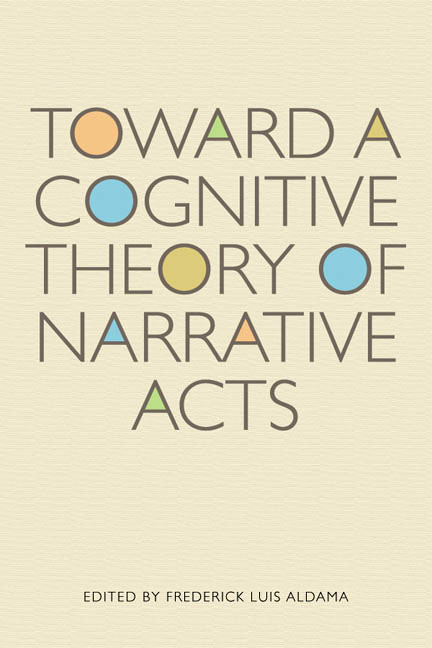 Toward a Cognitive Theory of Narrative Acts Toward a Cognitive Theory of Narrative Acts
Edited by Frederick Luis Aldama
Narrated by Kellie Fitzgerald
Available from Audible
Book published by University of Texas Press
Toward a Cognitive Theory of Narrative Acts brings together in one volume cutting-edge research that turns to recent findings in cognitive and neurobiological sciences, psychology, linguistics, philosophy, and evolutionary biology, among other disciplines, to explore and understand more deeply various cultural phenomena, including art, music, literature, and film. The essays fulfilling this task for the general reader as well as the specialist are written by renowned authors H. Porter Abbott, Patrick Colm Hogan, Suzanne Keen, Herbert Lindenberger, Lisa Zunshine, Katja Mellman, Lalita Pandit Hogan, Klarina Priborkin, Javier Gutiérrez-Rexach, Ellen Spolsky, and Richard Walsh. Among the works analyzed are plays by Samuel Beckett, novels by Maxine Hong Kingston, music compositions by Igor Stravinsky, art by Jean-Baptiste-Simeon Chardin, and films by Michael Haneke. Each of the essays shows in a systematic, clear, and precise way how music, art, literature, and film work in and of themselves and also how they are interconnected. Finally, while each of the essays is unique in style and methodological approach, together they show the way toward a unified knowledge of artistic creativity.
Frederick Luis Aldama is Arts and Humanities Distinguished Professor of English at Ohio State University. He is the author and editor of nine books, including Postethnic Narrative Criticism; Brown on Brown: Chicano/a Representations of Gender, Sexuality, and Ethnicity; the MLA-award winning Dancing With Ghosts: A Critical Biography of Arturo Islas; and Why the Humanities Matters: A Common Sense Approach.
REVIEWS:
“This highly impressive collection of essays features stimulating and cutting-edge research by some of the best people working in the new and important field of cognitive narratology. It shows beyond doubt that the cognitive sciences can shed significant light on the processes involved in our understanding of narratives in various media.”
—Alan Palmer, author of the award-winning Fictional Minds “Focused on the universal human capacity for narrative, Frederick Aldama's Toward a Cognitive Theory of Narrative Acts boldly stakes out a common space of knowledge at the intersection of the natural and social sciences and the humanities. The essays by leading cognitive critics provide important insights into the motivations and workings of narrative from Aristotle to contemporary film.
”
—Mary Thomas Crane, Professor of English, Boston College “Bringing both theory and application to bear on cognitive approaches to literary narrative, Toward a Cognitive Theory of Narrative Acts offers wide-ranging discussions using research apparatuses—critical, historical, and scientific—on the cutting edge of today's multidisciplinary studies. This volume posits useful terms for the erasure of some traditional boundaries that have determined and indeed restricted inquiry. In their place, it suggests empowering new models with which to figure the complex relationships between humanistic and scientific ways of knowing. Essays by Lindenberger, Priborkin, Zunshine, Abbott, Hogan, and Pandit-Hogan make particularly refreshing statements at these disciplinary cross-sections”
—F. Elizabeth Hart, Associate Professor, University of Connecticut, co-editor of Performance and Cognition: Theatre Studies and the Cognitive Turn “With Toward a Cognitive Theory of Narrative Acts, gone are the days when scholars imported models from secondary fields and applied them like so many stamping machines to works of literature and film. This exciting collection attests to the range and sophistication of current cognitive-evolutionary studies in narrative. Exploring the relation between narrative and topics including empathy, dream, torture and ethics, theory of mind, and emotional change, each essay demonstrates a thorough knowledge of the secondary discipline it brings to bear on narrative art. The contributors to this anthology, aspiring to a new interdisciplinary seriousness and embracing the story of our evolved humankind, demonstrate that cognitive approaches to literature and narratology have attained a new maturity. Knowledge is cumulative. Aldama's Toward a Cognitive Theory of Narrative Acts brings that cumulative power back to the study of the arts.”
—Nancy Easterlin, University Research Professor, University of New Orleans TABLE OF CONTENTS:
Chapter One. Arts in the Brain; or, What Might Neuroscience Tell Us? (Herbert Lindenberger)
Chapter Two. Narrative as Nourishment (Ellen Spolsky)
Chapter Three. Narrative Empathy (Suzanne Keen)
Chapter Four. The Biolinguistic Turn: Toward a New Semiotics of Film (Javier Gutiérrez-Rexach)
Chapter Five. Voice and Perception: An Evolutionary Approach to the Basic Function of Narrative (Katja Mellmann)
Chapter Six. Dreaming and Narrative Theory (Richard Walsh)
Chapter Seven. Cross-Cultural Mind-Reading; or, Coming to Terms with the Ethnic Mother in Maxine Hong Kingston's The Woman Warrior (Klarina Priborkin)
Chapter Eight. Theory of Mind and Michael Fried's Absorption and Theatricality: Notes toward Cognitive Historicism (Lisa Zunshine)
Chapter Nine. Garden Paths and Ineffable Effects: Abandoning Representation in Literature and Film (H. Porter Abbott)
Chapter Ten. Consciousness, Ethics, and Narrative: Reading Literature in an Age of Torture (Patrick Colm Hogan)
Chapter Eleven. Prophesying with Accents Terrible: Emotion and Appraisal in Macbeth (Lalita Pandit Hogan)
|

